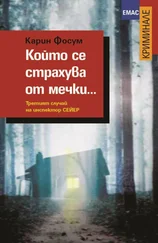‘Ragna,’ she heard, ‘Ragna!’
There was someone standing by her bed with a cordless phone. A guard who she had not seen before had come into the cell without her hearing, which was unusual.
‘Berlin,’ he said. ‘We’ll give you a few minutes.’
She sat up so suddenly that she felt dizzy. The cordless telephone was surprisingly heavy; she was breathing like a frightened animal and knew that her son would hear it all the way to Berlin.
At first there was some crackling on the line, perhaps it was tapped, but she did not give a damn. She had enough to cope with trying to regulate her breathing and stop her heart from running wild.
‘ Mutti? ’ she heard. ‘ Mutti. Wie geht’s? ’
Oh, that voice! It was Rikard’s voice, coming out of the receiver like a warm embrace, but it was much deeper than she remembered, much wiser and warmer. The last time they had spoken he was an angry boy, impatient to get out into the world. Now he was a twenty-nine-year-old grown man, tall, she imagined, with muscles, who had experienced both the good and the bad. And as the breathless seconds passed she realised that he was like Walther now. It was the same voice, deep, considered and friendly, there was something reassuring and inviting about it. Her grip tightened around the phone, she pressed it closer to her ear so he would be nearer. She remembered the day he was born, how she had held him, with the same feeling she had now. She would never let him go.
‘ Alles ist gut ,’ she whispered. ‘ Alles ist gut .’
She was immediately overcome with embarrassment at her choice of words and lack of voice. Then, quietly and cautiously: ‘Do you have everything you need?’
‘Yes, yes,’ he assured. ‘Christmas soon. I have friends here, you know. So, we’re in the same boat, you could say.’
Yes, he was in a boat. He had always liked to play in the old fishing boat at nursery. That was why he used that image, she guessed. He had felt safe in that boat. A hiding place from where he could watch the world through a porthole. He sounded happy. Content, at least, not broken or lost or humiliated. She was filled with a tingling joy. It rose from her feet to her cheeks, warming her, and she glanced in desperation over at the guard who would tear the phone from her hands in only a few minutes. She was sitting on the edge of the bed, leaning slightly forwards, eager as a young girl.
‘Yes,’ she whispered. ‘Many of us are in that same boat, Rikard. I wrote to you. To Landsberger Allee. Everything was sent back.’
Her son said nothing for a long time. Perhaps he felt ashamed after all, perhaps he was fumbling to find an explanation. She would not pressure him.
‘Sorry, I didn’t hear you,’ he said. ‘Can you try again?’
The line crackled, it irritated her, this was the world’s most important conversation between a mother and her son.
‘My letter,’ she whispered. ‘It was sent back.’
Another pause, and then a deep sigh.
‘I don’t have that flat any more.’
No, she knew that. That he had lost everything, his job, his position, his home. And the respect of others.
She did not want to cry, but could not help sniffling.
‘ Kann ich etwas tun? ’ he asked, all of a sudden.
She was pulled back in time to the pedestrian precinct and Ladies Choice and the Englishman William who had asked exactly the same. How strange it was that everything was connected, there was a meaning to everything. He was definitely like Walther, he had the same warmth, the same intelligent sensitivity and care that she had fallen for, that had made her feel safe.
‘Write to me!’ she whispered. ‘I’ll be here for a long time.’ She said each word with as much force as she could. Used everything the speech therapist had taught her, every muscle, every breath. ‘Can you hear me?’
‘Yes, I can hear you. I will write to you,’ he promised.
‘Write whatever you want,’ she whispered back. ‘You don’t need to explain yourself.’
‘ Du auch nicht ,’ he said.
Her throat tightened and her eyes welled up, and she was glad no one could see her. The officer who had been standing over by the window, coughed. She continued to clutch the telephone, to press it to her ear, which was now burning.
‘They will read everything, you know,’ she whispered.
‘That’s the way it is,’ her son replied.
The golden moment was over.
‘They’re saying I have to go. I’ll write!’
His last words. She wanted to thank him with all her heart. But she was so close to crying that she could not get the words out. All she managed to give him in parting was a little sob. Then she nodded several times, as she normally did when she wanted to finish a conversation. She nodded even though he could not see her. Then the line was cut.
‘He promised to write!’ she whispered, and beamed at the officer. She was reluctant to give the telephone back, as if he was still in there, lived there, and was now being carried away by unknown hands. But the air was full of glitter. A shower of golden glitter, like the stuff she remembered from her childhood that you could buy in long plastic tubes, that she loved to put on her drawings and home-made cards, and Christmas decorations, and sometimes even in her hair.
‘You’ll have to read it,’ she said to the officer. ‘The letter.’
‘Don’t you worry about that,’ he said kindly. ‘We don’t pore over every single word. Most letters say the same thing,’ he added.
Ragna stared after him, dumbfounded, as he disappeared through the door. The same thing? Most letters? What kind of a statement was that? Every letter was a unique document that related to a unique person in a unique situation. No one else had experienced exactly the same, in the same way, and no one else felt the same love that she felt for her son, because there was only one of him. Idiot, she said to herself about the officer. You’ve obviously got no children.
It was only a couple of minutes later that she really grasped the fact that they had spoken. He had been seventeen when she last heard his voice. He had come to the phone now, of his own free will, and spoken to her. She started to shake, her whole body was shaking. She wondered what the inspector had said when he rang to set up the call. He had said the right things, he knew how to touch people. But he had not mentioned their crimes, neither hers nor his. She felt another rush of joy through her body, her hands and feet were tingling, she had to stand up, pace back and forth across the cell. His voice, so mature and calm, evoked a very clear picture. He certainly did not have crutches. And he still had both his legs. ‘What about the boy?’ Walther had asked, in the dark outside the cafe. The boy, she thought with pride, as she stood in front of the window in her cell, her face to the light. The boy is wonderful, and I’ve just spoken to him.
Lars tapped in the six-digit number 007007, which he had chosen, to turn off the alarm. The red light stopped flashing and he opened the doors to the shop.
He liked being the first one in. It made him feel like the boss, which strictly speaking he was not, but the truth was that the others behaved as if he was their superior. He was strong and confident and well spoken, and a good head taller than the ladies, all obvious advantages of being a man. He turned on the lights, opened the till and then did the morning round, first through the shop, checking the well-stocked shelves, then out into the storeroom. They always set mousetraps at night, so he checked them next, but there were no dead animals. There were periods when he picked up dead mice like windfall, as there were plenty of biscuits and chocolate to be had. He started the coffee machine, looked over all the unopened boxes and crates that were piled from floor to ceiling. He checked the pricing machines, that there were enough labels, and if there was anything lying on the floor he picked it up and threw it away in one of the containers. Though, to be fair, there never was anything on the floor. Both Ragna and Gunnhild tidied up after themselves and kept things in order, the way women do. Audun was also learning the ropes. He stroked his thin beard as he walked around. Ragna came in without a sound. He noticed that she had not done her hair, the dry wisps of indeterminate colour were going every which way, and her shop coat was stained. Lars said nothing, but Gunnhild did, as soon as she came to work.
Читать дальше












